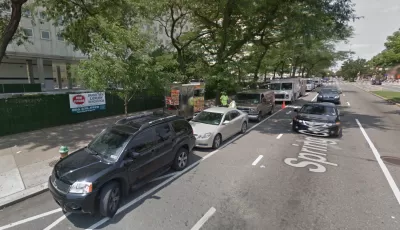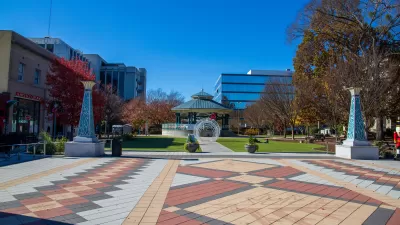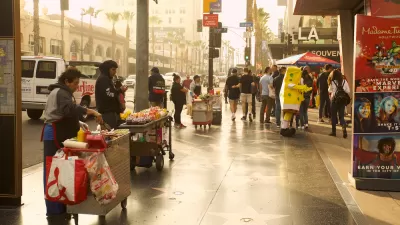Food cart vendors are fighting for their livelihood in a neighborhood in Philadelphia, against the long legislative reach of a local developer.

Jake Blumgart reports on the evolving legislative position of the city of Philadelphia on the matter of food carts in the city.
The story starts with the example provided by a collection of food cart vendors formerly located at a prime position near the Spring Garden Broad Street Line stop and on the same side of the street as the Community College of Philadelphia.
During construction of a new development by Bart Blatstein ("a one-story retail complex anchored by a CVS, right next to his Tower Place apartment building"), the food cart businesses were relocated to a much less prime position in the neighborhood and business has plummeted.
"The luxury apartments brought hundreds of new residents and the new shopping brought even more street traffic — growth that could help neighborhood entrepreneurs like [food vendor Mike] Debesai. But in the case of the food vendors, the new development has generated the opposite impact," according to Blumgart.
But that is only the beginning of this story. During construction, the City Council approved legislation, proposed by City Council President Darrell Clarke, to ban street vendors on Spring Garden between Broad and 16th streets. Since the Blatstein project opened, the food vendors haven't been able to return to their previous, more lucrative spot. The food cart vendors report feeling powerless to respond to the business interests of large developers.
FULL STORY: Food cart owners say City Hall is pushing them out of Philly. Here’s why.

Study: Maui’s Plan to Convert Vacation Rentals to Long-Term Housing Could Cause Nearly $1 Billion Economic Loss
The plan would reduce visitor accommodation by 25,% resulting in 1,900 jobs lost.

North Texas Transit Leaders Tout Benefits of TOD for Growing Region
At a summit focused on transit-oriented development, policymakers discussed how North Texas’ expanded light rail system can serve as a tool for economic growth.

Using Old Oil and Gas Wells for Green Energy Storage
Penn State researchers have found that repurposing abandoned oil and gas wells for geothermal-assisted compressed-air energy storage can boost efficiency, reduce environmental risks, and support clean energy and job transitions.

From Blight to Benefit: Early Results From California’s Equitable Cleanup Program
The Equitable Community Revitalization Grant (ECRG) program is reshaping brownfield redevelopment by prioritizing projects in low-income and environmental justice communities, emphasizing equity, transparency, and community benefits.

Planting Relief: Tackling Las Vegas Heat One Tree at a Time
Nevada Plants, a Las Vegas-based nonprofit, is combating the city’s extreme urban heat by giving away trees to residents in underserved neighborhoods, promoting shade, sustainability, and community health.

How Madison’s Tree Planting Efforts Are Growing a Healthier Community
Madison’s annual tree planting initiative is enhancing environmental resilience, public health, and community livability by adding 1,400 carefully selected trees citywide, with strong community and institutional support for urban forestry.
Urban Design for Planners 1: Software Tools
This six-course series explores essential urban design concepts using open source software and equips planners with the tools they need to participate fully in the urban design process.
Planning for Universal Design
Learn the tools for implementing Universal Design in planning regulations.
Ascent Environmental
Borough of Carlisle
Institute for Housing and Urban Development Studies (IHS)
City of Grandview
Harvard GSD Executive Education
Toledo-Lucas County Plan Commissions
Salt Lake City
NYU Wagner Graduate School of Public Service





























